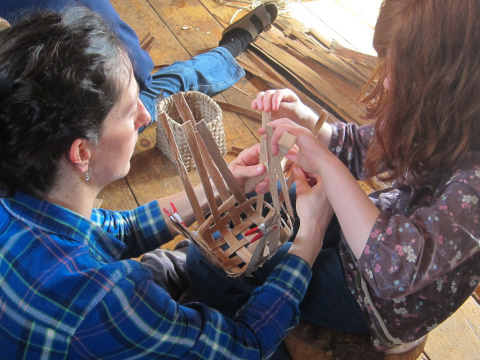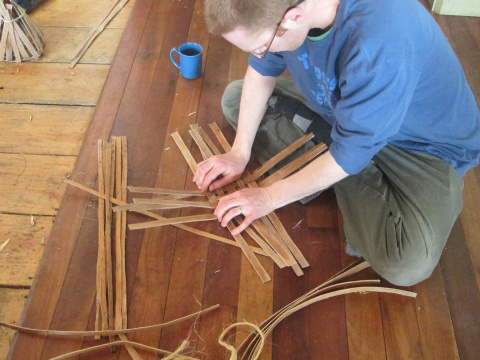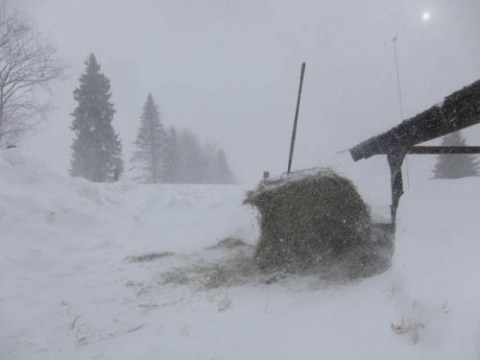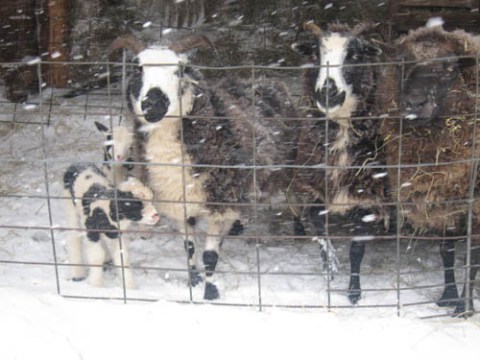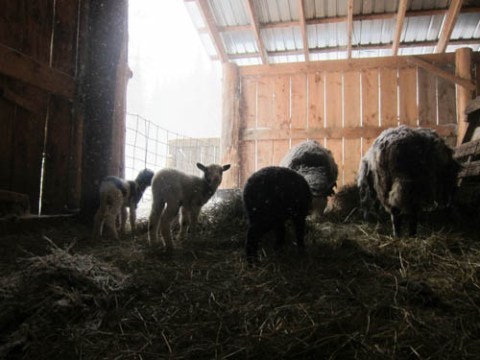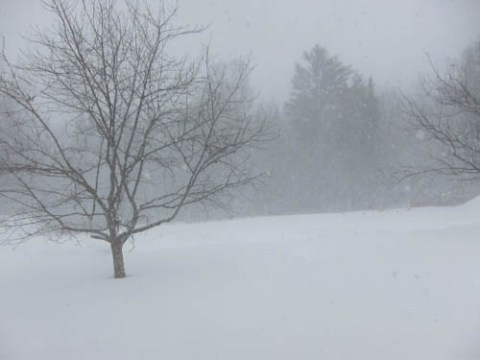Ben Hewitt's Blog, page 34
March 31, 2015
It Is Real Nonetheless
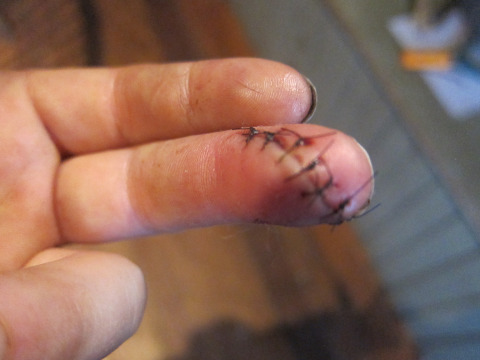
Sometimes a butterfly bandage just doesn’t cut it. Heh. “Cut” it… get it?
It’s nice that it’s a little warmer now. I dally over chores, stopping at each species to stand watch for a minute or two. I like watching the ducks drink after I chop through the ice in their watering hole. I like watching over the evolving relationship between Web, our pet duck who chooses barn life over communion with her kind, and Rye’s goats, Flora and Monkey. We moved Flora and Monkey from their usual winter shelter because the deep snow had made their fence superfluous, and they’d become prone to wandering.
Their relationship with Web did not get off on a good foot (hoof?): There were head-to-head standoffs between the duck and Monkey, and I’d have been worried if I didn’t know how fast that bird can move when it suits her. But at some point in the week after being introduced, the three made their peace, and now Web is forever preening her former adversaries, perhaps having decided that antagonism was getting her nowhere, and she might just as well annihilate them with kindness. The goats lean into her while she works her way up and down their backs with her bill. The goats are shedding in the changing season; the preening must feel good.
We’ve lived with animals long enough now that it’s hard to imagine a time we didn’t live with animals. I understand why most people don’t want to live with animals (I’m not talking about house pets, which for the most part are so adapted to the human environment that they demand relatively little of us); the commitment is not inconsequential. There’s no question that our lives are defined by our relationships to our animals, both in regards to our day-to-day comings and going, but also in how we perceive the world around us, and even how we perceive ourselves.
I thought about this yesterday, after reading Charles’ recent account of his encounter with a toddler. The piece spoke to me, in no small part because I understand full well what he means about grappling with criticisms both external and, most affecting to me, internal. I suspect this is a common phenomenon among writers or anyone else whose work exists in the public realm. Or maybe it’s straight up common to humanity. I also agree with Charles that part of the value of my work – it’s value to me, at least – is that I sometimes question its value. It is important, that questioning, the same way it’s important to occasionally question just about everything we think we know or believe. I have learned that the people most deserving of my trust and respect are not those who claim to have the answers, or who claim to know what answers I should have, but rather those who leave room in their hearts and minds for the possibility that the stories they cling to might not be as important as they believe.
Our animals do for me what the baby in Charles’ essay did for him: They remind me, on a daily basis, that my written work is merely one aspect of who I am, it is merely one medium for expressing what I think is important to me. And on those days when it feels as if I accomplish nothing else, they provide me the opportunity to know that at least I accomplished this: I fed them. I watered them. I tended to their needs. I stood for a moment and watched a duck preening a goat, something that only a few weeks ago would have seemed an unfathomable kindness between two arch enemies. I watched one cow stretch her rough tongue to scratch the hard-to-reach itch of another, and I wondered how this need is communicated. I stood over the pigs sleeping in their hay, their soft bellies rising and falling with each porcine breath, and I challenged myself to fill their trough without waking them.
I think these interactions – both between myself and our animals, and between our animals themselves – are worth more than any casual observer might understand. Perhaps worth more than even I might understand. Maybe because, as Charles posits, they are in some manner redemptive, almost an atonement for the myriad ways in which I fall short.
Or maybe they are worth so much for an entirely different reason: They are something that no amount of criticism, either external or internal, can sully. There is no viewpoint expressed, no belief espoused, no argument made, no position defended, no status to be attained or denied, and therefore, no ego to be inflated or deflated. There is not even a verbal acknowledgement of appreciation.
There is merely one creature meeting the needs of another, and the minutia of the interactions necessary to the task, so fleeting and routine that it’s easy to lose sight of their value. This is particularly true in a culture that does not acknowledge or even understand this value. For what is gained? I cannot show you. I struggle to even tell you. But I know it is real nonetheless.

March 30, 2015
If All Else Fails
For reasons I do not fully understand, I have picked up a lot of new readers over the past six weeks or so. I’m not sure where they’re coming from; things have been pretty quiet on the media front, as has the roll out of the new book. I’m fine with the quiet. Glad for it, actually. The few brushes I’ve had with widespread exposure have taught me that I’m best suited to the same quiet life I’ve been living for 40-odd years and which, if I can just keep a handle on the booze, rock n’ roll, and cigarillos, might be so lucky as to tease out for a few more circles round the sun.
That said, I’m glad for the readership here; it feels to me wholly different than whatever portions of my story are filtered (and inevitably distorted) through the mass media edit process. I’m not saying there’s no filter here; obviously, we are still entitled to our privacy. Still, this is by far the most direct and intimate medium for sharing my written work. Maybe that’s not true for all writers; a few have likely attained that hallowed status as to be uneditable. But to my knowledge, the number of editors out there clamoring so enthusiastically for my work as to be willing to relinquish their rightful authority is precisely zero. (If I’m mistaken, hey, be in touch, ok?)
Anyway. All this new readership comes precisely at the time when I’m faced with the reality of having to slow things down a bit here. I’m not sure exactly what this space is going to look like going forward, but I am pretty sure that it’s not going to include the sheer volume of work and frequency of posting is has over the past few years. This is not for lack of desire on my part – I’ve got more ideas for this space than I could explore even if it were my full-time gig – but rather an acknowledgement of our current reality, which includes the for-pay writing that keeps us in the highfalutin manner to which we’ve become accustomed, the impending building of house, barn, and shop, and our desire to make something of this nutty “living arts” school idea (by-the-by, crazy good ash basket workshop this weekend and if’n you’re interested in our upcoming apple tree workshop, led by our good friend Todd Parlo, be in touch quick… it’s filling right up!).
So what I thought I’d do today, for all these new readers (and perhaps for the old ones, too), is offer a sort of cliffs notes to this space. That way, you can decide if you really want to keep kickin’ round for whatever this blog turns into. Better yet, for those of you who might be inclined to wade through the past 520 posts (feckin’ A! Can you believe that?!?), this could save you a whole lotta time that’d probably be better spent doing something that doesn’t include a screen.
So, without further ado:
1) Childhood education is incredibly important. This explains why we don’t send our children to school.
2) The things you are taught to be afraid of (including, but not limited to: terrorism, death, impoverishment, lack of status, and funny looks from strangers) are almost always a distraction from the things you should actually be afraid of (including, but not limited to: crushing debt [which is to say, an amount of indebtedness our insane culture considers entirely normal], utter dependence on industry, a destroyed biosphere, waking up in the morning wishing you were waking up somewhere else, and fear itself).
3) This is the best contemporary rock n’ roll song ever written. No, wait, this is. Actually, forget it: Rock n’ roll is way overrated.
4) You know what’s crazy? This: Most of the things our culture teaches us to recognize as strength (including, but not limited to: never admitting to needing help from one another, responding to antagonism in kind, and living “independently”) are actually emblematic of weakness. Meanwhile, most of the things our culture teaches us to recognize as weakness (including, but not limited: acknowledging our need for help, emotional honestly/vulnerability, and admitting our weaknesses) are actually emblematic of strength.
5) The best thing you can do for your children is find ways for them to be of use to themselves, their family, and their community.
6) The best thing you can do for yourself is find ways to be useful to yourself, your family, and your community.
7) The same could be said of your elders.
8) Here you go.
9) This is going to sound cheesy, but hell with it, it’s true: More often than we care to admit, the only difference between someone who’s doing what they want to do and someone who’s not is that the former is doing it. Heh. Chew on that one awhile.
10) While you’re chewing, here’s another: If there are only winners, there can be no winners.
11) If ever you have the opportunity to squeeze into a hollow tree, by gum, do not pass it up. Likewise, if you ever have the opportunity to stand between two rows of dairy cows, listening to them chew, jump on it.
12) Make room in your life for discomfort and inconvenience. The really crazy thing is, you might have to work for this; you might actually have to inconvenience yourself in your quest for inconvenience. But it’s totally worth it.
13) Give away something of value, if for no other reason than it’ll help you to remember how rich you actually are.
14) If all else fails, be curious.

March 27, 2015
In The First Place
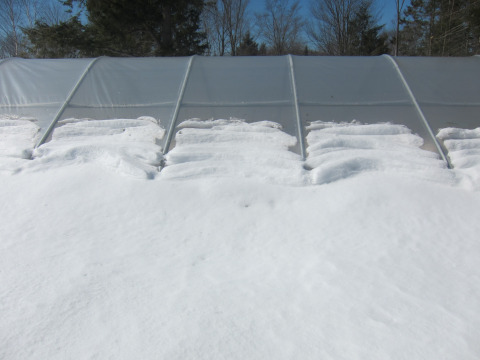
Yeah, we still have just a little snow
I’ve been getting questions about our building plans, both here and privately. In part because of this, and in part because I can feel myself transitioning away from written creativity as my body and mind adapt to the physicality of the season, I thought I’d share some of the nuts and bolts of our forthcoming project. If you’re looking for my usual ponderous, navel-gazing pontificating about the joys of rural living, the shackles of institutionalized education, and the imprisoning nature of the contemporary extractive economy, well… you might’s well just stop reading now.
We are building a small-but-not-quite-tiny house, measuring 20×26 to the exterior foundation walls. This will give us a solid 18×24 “clear,” which is the inside-to-inside of wall dimensions. The house will be two floors, with a three or maybe even a four-foot knee wall on the second floor. As with many of our plans, factors like the exact height of our knee walls are a bit fluid, and the final outcome will depend on other factors, such as the size of the used windows we find to fit those knee walls.
By-the-by, I’ve found this flexibility to be the key in building on the cheap; the worst thing you can do if you’re trying to build on a budget is be inflexible regarding plans and materials. For instance, we’ve sourced all of our windows either used or (primarily) from contractors who got stuck with new windows that did not meet the inflexible needs of their affluent clients. All the windows we’ve purchased are high end – either Marvin Ultimate or Andersen 400 series – and we haven’t paid more than 30 cents on the dollar. Actually, in most cases, we paid much less. (as an aside – and I might have mentioned this before – I bought a bunch of windows off a contractor who told me that the average window bill on one of his jobs is 90 freakin’ grand, which is about 300% more than we’ll be spending on our entire house) Our windows will not all match, but we’re fine with that, and it’s yet another example of flexibility and acceptance of imperfection creating an opportunity for us. Beside, as the hyper-talented and delightfully-opinionated Richard Sachs likes to say, “imperfection is perfection.” Damn straight, and particularly so when it results in debt-free shelter.
The aspect of our project that’s proved most vexing to us is insulation. That’s because our needs are somewhat unique: Since we’ll be cooking only on wood, we need to generate a certain number of BTUs just to feed ourselves. This raises an interesting problem: If we make the house too tight and too well-insulated, it ain’t just our food that’ll be getting cooked. We’ll fry ourselves right outta the place.
For this reason, we’ve dispensed with a preliminary plan that included straw bales and other super-insulating techniques. We will use dense pack cellulose insulation, which from our perspective offers the best balance of insulating qualities, economics, and toxicity (or lack thereof). We’ll frame our walls in a modified Larsen truss design that’ll give us 8″ of insulation with very little thermal bridging. The roof will be straight 12-inch rafters. Honestly, I think we’re still risking making the place too-well insulated for our particular needs, but we’re willing to run that risk, since we can always crank open a window or two, or just strip down and go roll ’round in the snow bare ass nekkid (if that don’t keep you from stopping by unannounced, I don’t know what will).
There’s a lot more to say, but paying work is calling, so I’ll just add this. I had a revelation about shelter and shelter related systems a few years ago, when I was bemoaning the impending replacement of our solar storage batteries to an older back-to-the-lander who also lived off-grid (this was before we decided to grid connect our system and dispense with the batteries entirely). The batteries we were eyeing at the time were gonna run us about 5 grand, a chunk of change that was going to wipe us out financially and furthermore underscore our utter dependence on industry and its oft-rapacious practices. I mean, lead acid batteries don’t just grow on trees, know what I mean?
What do you do when your batteries need replacing? I asked.
Well, he said, I just replace the battery in my truck, and use the old battery for the house.
In other words, his system was so small and simple, and his expectations were so friggin’ modest that he wasn’t faced with a similar quandary.
I’m not saying we’re ready for a one-battery solar system (though the house will be off-grid, with about 400-watts of panels), but I took a lot away from his response, which is this: The answer isn’t creating complex “green” systems to replace complex “dirty” systems, as seems so common in this day and age, probably because if the answer isn’t complex, there’s not much profit in it.
Instead, maybe the answer is getting away from complexity in the first place.

March 26, 2015
One Without The Other
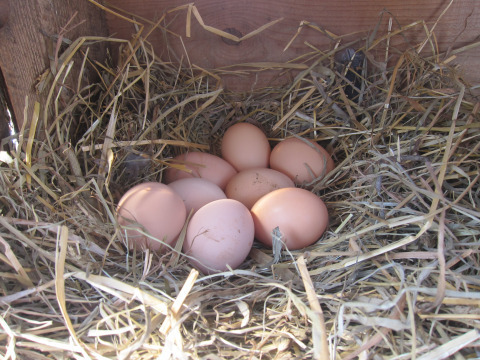
The girls are back in business
It was lights out at 8:00 last night; the boys and I were in recovery mode from the Blackberry Smoke concert we attended the previous evening, a raucous affair that lasted into the wee hours. Courtesy of a highly inebriated middle age couple who took a liking to my children (and then got hauled off by security for being so drunk they could hardly stand [the couple, not my children]), the fellows were afforded a front row perspective, peering over the security barrier in wide-eyed wonder. I suppose some would deem it irresponsible that we expose our children to the debauchery of an honest-to-goodness rock n’ roll show, and indeed, they were the only young ‘uns in attendance. But then, I suspect it’s only a fraction of the debauchery most kids experience over the course of the average school day, so there. Plus, we have a wicked weakness for old fashioned ass-kicking rock, and BBS definitely qualifies.
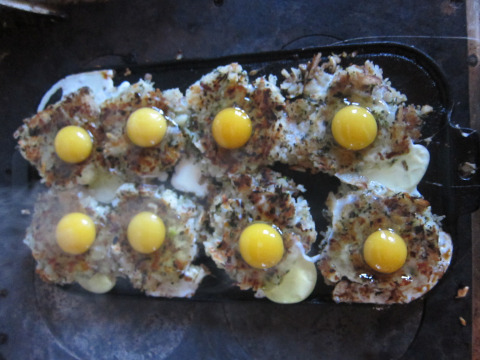
‘tater and onion pancakes with eggs on top. Not bad at all.
The spring thaw has finally commenced. Yesterday touched 50, the sun in full bloom, the snow slowly retreating under its glare. I spent an hour on the tractor, busting out a path for the feeding of our remaining round bales, and at one point I had to just stop and sit for a few minutes, soaking up a dose of Vitamin D. It’s been hard winter. That’s not a complaint; just a statement of fact, and if anything, I am grateful for it, because I know my appreciation for days like yesterday is in large part informed by the preceding weeks and months. I guess it’s analogous to something I wrote about the writing process a while back: The pleasure isn’t just tilting my my face to the sun on the first jacket-less day in five months, but rather in the contrast between all those raw, bundled days and that moment yesterday afternoon when I shut the tractor off and sat in the sudden silence, remembering (not that I’d forgotten, but still: Remembering) that for all its flaws, the world is an amazing place, and that furthermore, for all my flaws, along with the myriad small hardships we endure to live as we do, my life is good. It could even be said, perhaps, that it rocks.
I think this: You cannot have warmth without cold. Satiation without hunger. There is no comfort without discomfort, no restoration of body and spirit without their fatigue. What I’m saying is, you cannot exhale without having inhaled.
Yesterday, I exhaled. And it felt really friggin’ good.

March 24, 2015
Good Times
Just a couple of quick notes.
First, we’re super-excited to offer an Earthskills Immersion Camp on our land in Stannard, Vermont this summer, for ages 11-15. For more details, head on over to the LMLA site. This is going to be an awesome camp, chock full of all sorts of wilderness adventure and learning.
Second, I’ll be at one of my most-favorite book stores in all the world this Sunday. I might even bring along a karaoke machine slide projector for added entertainment value! I’d love to see you there.

March 23, 2015
A Sound You Should Hear
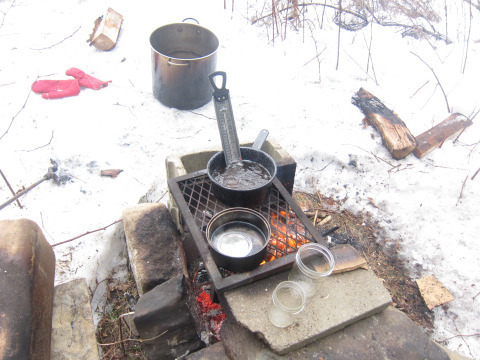
Rye’s sugaring rig, circa ’14
I drove up from Connecticut on Friday night in our new-to-us truck, a 25-year old Ford F250 fresh out of Arizona, its body as rustless as the day it rolled off the factory line. It’d been a hell of a day; I’d ridden to Boston with Pen and the boys on their way to visit Penny’s mother, then hopped a bus over to Hartford, then cooled my heels for three hours waiting for the seller to get off work, then steered the old brute into the teeth of a late winter storm, a three-and-a-half hour drive made into nearly six hours by the weather.
The snow was minor but snot-slick, and I passed no fewer than a half-dozen accidents along my journey up Interstate 91, including one particularly disturbing six-car pileup. I let my eyes wander over the twisted metal until they landed on the sight of a rescue crew cutting into the compressed passenger compartment of a turned-over sedan. I averted my gaze and could not help wondering at the things we have come to accept.
It is spring now, or ostensibly so. The cold remains penetrating. Zero this morning, and the wind gusting out of the north. The snowpack is undiminished. The maple trees are frozen, holding tight to their sap, while the sugar makers fret and pace. In deference to all we have on our plates, we tapped only a handful of trees this year, just enough for a bit of “spring tonic,” the fresh sap we’ll make into tea or drink straight from the bucket. We’ve had but one small run thus far.
Yesterday I consolidated the remaining square bales, as much for the work of it as anything else. We have plenty of hay. Well, maybe not “plenty,” but certainly enough. It was cold in the barn but windless, and I broke a sweat.
I feel a bit in limbo, caught between the weather and everything that needs doing. We are keeping ourselves busy – cleaning and re-cleaning, organizing, sketching plans, accumulating materials, jettisoning all the things we will no longer have room for and never really needed to begin with. The home we will build this summer will be less than half the size of this one, and it will not have a basement. There can be nothing extraneous. We will, quite literally, need to reduce our material possessions by 50% or more. If I had to guess, I’d say we’re at the 30% mark. Which means we’re getting to the hard stuff; yesterday, I dismantled a wooden box Fin made for me (birthday? I can’t quite remember, but probably) many years ago, all odd angles and bent-over nails. I pulled the nails, fed the wood to the fire, felt a small ache of sentiment as the flames jumped.
Still. You know what it feels like to be well on your way to dispensing with half your belongings? It feels like a good sweat on a cold day. It feels like the first day of spring – not calendar spring, but real spring, 50-degrees or more, the sun high and strong, the maples finally letting go. Plink. Plink. Plink. The sound of sap into buckets. That’s a good sound. That’s a sound you should hear.

March 18, 2015
I Like It a Little Less
For breakfast, I fried a pork chop and scrambled some eggs. Diced a few potatoes, dropped them into hot duck fat and left them there until they crisped up nice. Kimchi. I cut the chop four ways, served everything into the wooden burl bowls Penny carved a while back. Stuck one of her wooden spoons into each bowl, set them around the table. We eat most of our meals out of those bowls now. We joke that when we move to the new land, we’re not taking any plates. Just those bowls. Just those spoons. Actually, we might not be joking.
It’s not true that I’d rip your throat out for a green salad. You knew that, right? For one, it wouldn’t be very nice of me. For another, it’s real hard eating salad with a wooden spoon, though I guess maybe I should start practicing. For yet another, I got my kimchi, my lacto-fermented green beans, my hateful beets, all those potatoes. I got applesauce and blueberries and currants and even a couple more bags of frozen peas. Dried kale, dried celery leaves, dried chanterelles, dried onions. Garlic. Today we start drying off Pip in preparation for late May freshening, so no fresh milk for a good while. But that’s ok: We froze something like 50-quarts of cream. We’ll drink that. No one’s suffering, here. We’ve got our wooden bowls and our wooden spoons and wood for the fire and almost more food than we know what to do with.
For the first time ever, I deleted a comment. It didn’t add anything to the conversation; it was just name-calling, one commenter to another. Unnecessary. I think it’s great that I have readers who don’t always see eye-to-eye with me or with one another. Actually, I think it’s a huge compliment to us all. We talk about polarizing issues, in a polarized world, in a medium that encourages polarization. And yet I rarely see unpleasantries. Maybe we’re not always annihilating one another with kindness, but we’re doing pretty good. Let’s keep it up.
This space is probably going to slow down a bit in the coming months. We have a house to build. A barn. Some sort of workshop. We’ve done it before, we know what to expect, although part of what we expect is the unexpected, the “known unknowns” inherent to any project of this scope. They’ve been getting me up early, all those known unknowns. I sleep like a stone until 4:30 or so, then rise with my head full of uncertainty. I start the fires, drink my coffee, dice the morning potatoes, wait for first light so I can do chores.
It will be good to actually start working, but first we need the snow to melt and the frost to come out of the ground. We are still collecting materials – last night, I crammed 400-square feet of salvaged maple flooring into the poor Subaru. We still need a front door, but that’s about it. I am keeping careful track of expenses, and I will be happy to share those, if anyone’s interested. We have about $30k to spend, maybe $35k if we stretch it a bit. We can’t really go over budget. Well, we can, but then we’d be in debt. So as far as we’re concerned, we can’t. Thus far, the only expense that’s looking as if it will be greater than anticipated is our lumber budget; I’d hoped to cut and saw logs all winter, but the snow pack has made this unfeasible. So we’ll be buying in more lumber than we’d like. Fortunately, lumber’s pretty cheap. Fortunately, I came in low on our window budget, even if I had to drive to western Massachusetts twice to retrieve used units. Even if all the windows don’t quite match. I came in low on the chimney budget, too, got the flooring for less than I’d figured. But things are going to come up. I know that all too well.
Penny says if too many things come up, we’ll just pitch a wall tent and live in that for the winter. The boys like that idea very much. I like it a little less.

March 16, 2015
At The Exit

Up next
Cold again this morning. I started chores early for no good reason than I’d risen early, and it was nice to be outside on the leading edge of daylight, the sky turning shades of pink and blue above me. Yesterday’s snowfall had obscured our bootways, and every third or fourth step I’d land wrong, slide off the packed path, and sink to the thigh. Set down the hay bale, the slop bucket, the water pail, heave out my leg, pick up my load, walk, repeat.
Rebecca Solnit has a nice essay in the new issue of Harper’s, called “Abolish High School.” Here is some of what she writes:
Suicide is the third leading cause of death for teens, responsible for 4,600 deaths per year. Federal studies report that for every suicide there are at least a hundred attempts – nearly half a million a year. Eight percent of high school students have attempted to kill themselves, and 16 percent have considered trying. That’s a lot of people crying out for something to change.
We tend to think that adolescence is inherently ridden with angst, but much of the misery comes from the cruelty of one’s peers. Twenty-eight percent of public high school students and 21 percent of private school students report being bullied, and though inner-city kids are routinely portrayed in the press as menaces, the highest levels of bullying are reported among white kids and in nonurban areas. Victims of bullying are, according to a Yale study, somewhere between two and nine times more likely to attempt suicide. Why should children be confined to institutions in which these experiences are so common?
Solnit’s question is rhetorical, but that doesn’t mean there isn’t an answer to it. Or many answers, probably, but for the sake of expedience, I’ll suggest only one: Because their parents can’t imagine something different. Part of the reason they can’t imagine something different is because they can’t afford to imagine something different. And partly, it’s because they’re afraid to imagine something different – in my experience, that fear is oriented primarily around their children’s social and economic prospects. In short, they worry that if they don’t send their kids to school, their kids will become outcasts with few prospects for gainful employment. Better to risk the bullying than the job prospects, and besides, at some point, kids have to learn that not everyone’s going to treat them nicely, don’t they?
But I also think many parents can’t imagine something different because they don’t know there’s something different to imagine. They are not aware there are other paths to walk. Because as Solnit also writes: High school is often considered a definitive American experience, in two senses: an experience that nearly everyone shares, and one that can define who you are, for better or worse, for the rest of your life. This is how the story of school has become so foundational; as adults, most of us have been defined by it, and we have come to depend on it to understand, at least in part, who we are.
Which begs the question: Who are we? Many things, of course. Far too many to list here. But among them, we are a culture that compels their children to be confined daily to a space where 28% of them are bullied. Furthermore, we are a society that comprises 4.6% of the world’s population, but consumes 80% of the world’s pain medication. Depending on age group and gender, nearly 25% of us take drugs to treat our depression.
When people read interviews with me and criticize what I have to say about education, I often wonder what they see in the institutionalized school system that is so worthy an alternative. Are they thinking of the 72% of children who aren’t bullied? I mean, hey, that’s a majority! Nice work. But what of the bullies themselves, if one can be so compassionate as to think of them? I’ve known a few bullies in my life; I even know one or two now. None of them seem very happy to me.
Or are they thinking of the economic opportunities they presume unschooled children won’t have? They are, or at least they say they are, and in a way, this makes me saddest of all, because it suggests that a child’s education should first and foremost be subservient to their economic interests.
Still, sometimes I wonder if the reasons stated for their opposition run even deeper. As Solnit writes, school has become a definitive part of the American experience. It is apple pie, it is Fourth of July, it is part and parcel of our faith that the story we’ve all grown up inside, the story we are all – to varying degrees and by varying levels of complicity -invested in is the right story.
As I went about chores this morning, stumbling and slipping along our well-worn boot packs, I was thinking about how our foot travel has mostly been limited to those prescribed paths for so long. And it occurred to me this morning how liberating it will feel to be able to walk where we please, as if, having been trapped in a labyrinth for all this time, we suddenly find ourselves at the exit.

March 13, 2015
Except When It’s Not

Wedding day shave, August 15, 1998
In just the past week, I’ve had email exchanges with three different blog readers, in which each of them expressed a degree of shame for having not contributed to the generosity enabler. Naturally, I berated them as mercilessly as they deserved and furthermore attached photos of the boys undergoing back alley surgeries to remove extraneous organs for resale on the black market. I mean, like I said, we’re in the market for a new-to-us truck, and they don’t just give those things away.
In all seriousness, it is certainly not my intent to sow guilt. I’ve said it before, but I suppose it bears repeating: If you are called to contribute, it is greatly appreciated. Not only is writing how I earn the bulk of our cash living, there are hard costs to the maintenance of this space. I have all sorts of ideas for things I’d like to bring to this site that I believe will be gratifying for myself and my readers alike. For instance, I’m super-interested in creating an audio component, not merely (or even primarily) to tell our stories, but to tell the stories of others. As an example, I love, love, love what Erica is doing with Rumble Strip VT. Whatever I might or might not do will of course be different from what she does in all the ways I am different from Erica. But tarnation, I think it’s a cool idea.
Whenever I bring up money on this site, someone or another seems to get their undies in a bunch. It’s a little mystifying to me, honestly. It’s not like I’m threatening to put it behind a paywall or anything like that. I suspect it would be more acceptable if I just put up a bunch of ads; we’re so accustomed to being exploited in this manner that we hardly notice it anymore. As a friend of mine said to me recently, in relation to his decision to sell ads on his website, “capitalism gets you every time.” Wise words, those. For what it’s worth, I don’t cast aspersions on my friend’s decision; hell, he’s probably definitely the smarter of the two of us.
Anyway. I believe it’s important to be transparent about all this. I don’t ask for contributions because money is tight; I ask for contributions because I have faith in the value of what is offered here, and because I’d like to be able to afford to continue offering it. Maybe even to offer more. It’s as simple as that.
That said, don’t ever feel guilty because you’re not in a position to contribute. That’s not what it’s about.
• • •
In the wee hours of this morning, right after Daisy dawg got a hair ‘cross her ass and starting barking to beat the band at 4 a. friggin’ m., I was lying in bed mulling over the whole transportation/materialism issue a bit more. Now, I do not generally have my most-congent thoughts after being awakened at four in the morning, so bear with me, ok?
The first thing I was thinking about was an ad I’d seen in a recent issue of the New Yorker for Lincoln, touting their new Black Label service (I was gonna link to it, but it’s a total waste of your time and mine). “When was the last time you used the word luscious to describe your commute?” reads the ad, and I choked a bit on the bile in my mouth. Luscious? Lusc-fucking-ious? To describe driving to work?
Herein lies at least one problem with our car-addled society: We try to make driving tolerable. Comfortable. Fun, even. I remember when we first got the ‘ru from Penny’s folks, and how utterly blown away we were by all the creature comforts. I mean, did you know that some cars have buttons you can push, and that when you push ‘em, your ass gets hot? I am not kidding. Cruise control! Anti-lock brakes (which, as anyone who actually knows how to drive can tell you, make stopping on ice almost impossible. We pulled the damn fuse). The driver’s seat has something like six different adjustments; some nights, when I’m having trouble sleeping, I head for the car. No, I don’t, because I never have trouble sleeping. But you get my point.
Here’s what I think. I think driving should suck. I think car seats should be hewn of bare rusted metal. I think instead of striving for greater fuel efficiency, we should mandate that all cars get 3 mpg tops, making it as financially painful as possible to operate them. Windshields should be outlawed; you wanna go somewhere, you put on your damn aviator goggles and stick your face into the wind/rain/snow. Radios are allowed, but only if permatuned to “today’s best soft rock.” And so on.
I realize that according to this logic, we should just hang onto the diesel truck that gives Penny such fits. Probably oughta pipe a small stream of it’s pungent exhaust into the cab; not enough to make her sick, of course, but enough to ensure the damn thing only gets driven when it well and truly needs to be driven. Stick that really crackly live Motorhead bootleg I’ve got into the tape deck and put it on repeat. Glue the volume knot at 11. That sort of stuff.
Anyway. This all sort of ties into the whole brief frugality/thriftiness/materialism discussion that erupted in the comments pertaining to yesterday’s post, in which it was generally agreed that our society doesn’t need less materialism, but a different sort of materialism, one that actually values, respects, maybe even reveres the material objects under our purview. Someone posted the following passage from John Michael Greer, which I think is spot on:
Americans are arguably the least materialistic people in the world; no actual materialist—no one who had the least appreciation for actual physical matter and its sensory and sensuous qualities—could stand the vile plastic tackiness of America’s built environment and consumer economy for a fraction of a second. Americans don’t care in the least about matter; they’re happy to buy even the most ugly, uncomfortable, shoddily made and absurdly overpriced consumer products you care to imagine, so long as they’ve been convinced that having those products symbolizes some abstract quality they want, such as happiness, freedom, sexual pleasure, or what have you.
Furthermore, I am reminded of this short list of rules for consumption that someone emailed me, contrived by none other than Wendell Berry.
1 – Be happy with what you’ve got. Don’t be always looking for something better.
2 – Don’t buy anything you don’t need.
3 – Don’t buy what you ought to save. Don’t buy what you ought to make.
4 – Unless you absolutely have got to do it, don’t buy anything new.
5 – If somebody tries to sell you something to “save labor,” look out. If you can work, then work.
6 – If other people want to buy a lot of new stuff and fill up the country with junk, use the junk.
7 – Some good things are cheap, even free. Use them first.
8 – Keep watch for what nobody wants. Sort through the leavings.
9 – You might know, or find out, what it is to need help. So help people.
It’s a good list, and contains valuable reminders for us all, including myself. The only thing I feel compelled to add is that I don’t generally like hard and fast rules (hence my proclivity for making them and then adding ridiculous disclaimers like “this is true, except when it’s not”); the world seems to me like a nuanced place, demanding of a certain amount of nuance to navigate with equanimity. But there’s nothing wrong with a little guidance, either.
Finally, I will say that I believe there’s a fine line between appreciating/respecting/revering our material belongings and becoming captive to their care and feeding. A friend of ours likes to tell the story of someone he knows who is so in love with his truck that he won’t carry anything in the bed, lest it become blemished. I suppose one might argue that this person has a certain reverence for his truck, but I’m not convinced it’s a healthy reverence.
So then. Reverence for material belongings is a good thing.
This is definitely true.
Except when it’s not.

March 12, 2015
Fermented This and Fermented That
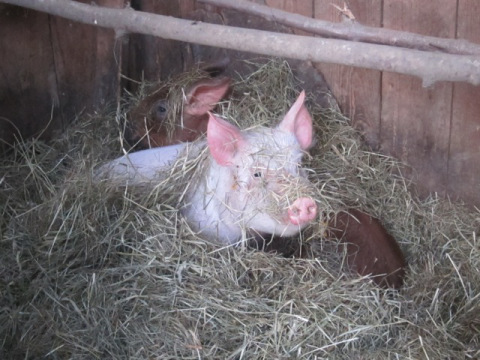
Rise n’ shine
I think sometimes folks get the mistaken impression that we live entirely off the bounty of the land (gee, wonder where they mighta cottoned to that idea). Or they think that just because on the cover of one of my books I claimed to have quit worrying about money, we actually don’t worry about money (really? You believed me?!?). Or they figure we’re milking the trust fund teat for all she’s worth (someone actually accused me of this recently, and then refused to believe me when I told her it wasn’t true, and I just sorta shrugged my shoulders because what, really, are you going to do with that scenario?).
Anyhow. Truth is, we spend plenty of dough. Pretty much everything we make, as a matter of fact, which generally adds up to somewhere around $3ok annually, although over the past couple of years we have managed to save more of a cushion than we’ve had in goodly while (we’ll probably blow it all this summer, however. You know, on crazy stuff, like putting a roof over our heads). In some regards, I suspect our expenses are a bit different than most folks; in some regards, I suspect they’re probably pretty similar. We don’t budget; I’ve always felt as if budgeting is a colossal waste of time, not to mention being right up there with plucking nose hairs on the fun-o-meter.
Generally speaking, I consider us thrifty, more than frugal. This is because to me, thriftiness speaks of an ethos of respect and perhaps even reverence for what we consume – it is what compels us to catch the blood from the sticking wounds of our pigs, for instance – while frugality is merely about pinching Penny pennies. Admittedly, I haven’t actually researched the official definitions of these words, so take this all with a grain of salt.
Anyhow again. I thought it might be kinda fun to talk a bit about where we spend the bulk of our dough.
Transportation: Because we don’t have a mortgage, this is by far our single biggest expense. We drive a crazy amount. How much, you ask? Honestly, I don’t want to tell you, ‘cause I’ll bleed out every last drop of so-called sustainability cred I might otherwise have accrued over the years. Your notion of me as flowing haired, robe-clad benevolent will go up in same hazy cloud of smoke that bellows from the dual tailpipes of our truck on startup.
Ah, screw it. I wasn’t fooling anyone, anyway: We drive somewhere around 25,000 miles annually, split between the car (about 23k) and the truck (you do the math). Our car is a 2005 Subaru that was gifted to us when Penny’s folks quit driving. It is BY FAR the nicest, most reliable vehicle we’ve owned, though it is old enough to require occasional mechanical interventions and, like all Subarus, it’s a thirsty little bugger: We average about 23mpg, and except when I’m learning the boys how to blow donuts, we go real easy on her.
Our truck is a 1997 Ford F350 Powerstroke. It’s been a real good truck overall, but we are ready to let it go, in large part because Penny is super-sensitive to the sweet nectar of diesel exhaust, and they don’t call these pigs Powersmokes for nothing. Unfortunately, we need a big truck, because we do tow on occasion (hay and tractor), and though we don’t drive the truck much, when we use it, we tend to use it, if you know what I mean. Anyhow, if any of ya’ll have a nice, rust-free ¾ or 1 ton 4wd gas pickup you want to let go for a song, drop a line, eh? Likewise, if any of you are looking for a solid plow rig, and furthermore have a healthy appreciation for diesel fumes, lemme know.
The sum total of all this is that we spend upwards of $3k a year just on fuel for our rigs, plus maybe another $300 in diesel for the tractor. This is ENORMOUSLY frustrating to me, and never mind that maintenance is probably about that much again – for instance, in the past six months, we had to do the head gasket in the ‘ru, deal with some fuel related BS in the truck, fix the front end on the truck, do new brakes on the ‘ru (ouch), and a few other odds and ends. I wish I could say I was mechanically inclined, but alas, I cannot. I’d like to think that if I had some sort of shelter in which to flail around, I might accomplish something of value, but I suspect that’s a pipe dream.
By-the-by, at least half the miles we put on the car are work-related, what with all the driving I do for book events and reporting stories and whatnot. So there’s that.
Food: As I’ve written before, it’s sort of hard to determine how much we actually spend stuffing our faces. I mean, I could add up all the inputs – hay, grain, amendments, and so on – and I could even include depreciation on equipment. But I’d still be faced with trying to put a value on all we get besides food. For instance, last fall I trucked something like 45 yards of compost up to the new land. I don’t really know what a yard of organic compost goes for these days, but I bet it’s north of $60.
So yeah, this is a hard one. I can say that our grocery store spending is real low; most months, not more than $100. But this is dependent on eating habits that most people simply aren’t willing to adopt. With the sole exception of a head of broccoli we bought to put in the soup we made for the spoon carving workshop, we haven’t purchased fresh vegetables all winter. No meat, obviously. No milk, though we’re out of our butter, so we’re onto the boughten stuff until the cows freshen in May. We buy a little flour for the occasional loaf of bread or pancakes, and we buy cheese now and again. Anyway. I’ve been through all this before, so I’ll shut my yap.
Actually, I won’t, because I think this is a real Achilles heel for those who aspire to some version of this life. Truth is, it’s not always easy to eat primarily what we produce, even given the diversity of our little operation. I mean, I’d rip your throat out for fresh greens right now. I ain’t kidding: If you’re sporting fresh greens, you ought just stay clear, ok, ’cause for the past five months or so, it’s been fermented this and fermented that, dried this and dried that, meanwhile rationing out the precious frozen peas and green beans (“son, it’s a very special day: You can have TWO peas!”). Oh, and potatoes and squash sixteen ways to Sunday. And beets. Damn, but I hate me some beets.
This is getting too long. Might have to pick it up another day. If any of you have specific questions, leave them in the comments and I’ll try and get to ‘em.

Ben Hewitt's Blog
- Ben Hewitt's profile
- 37 followers



